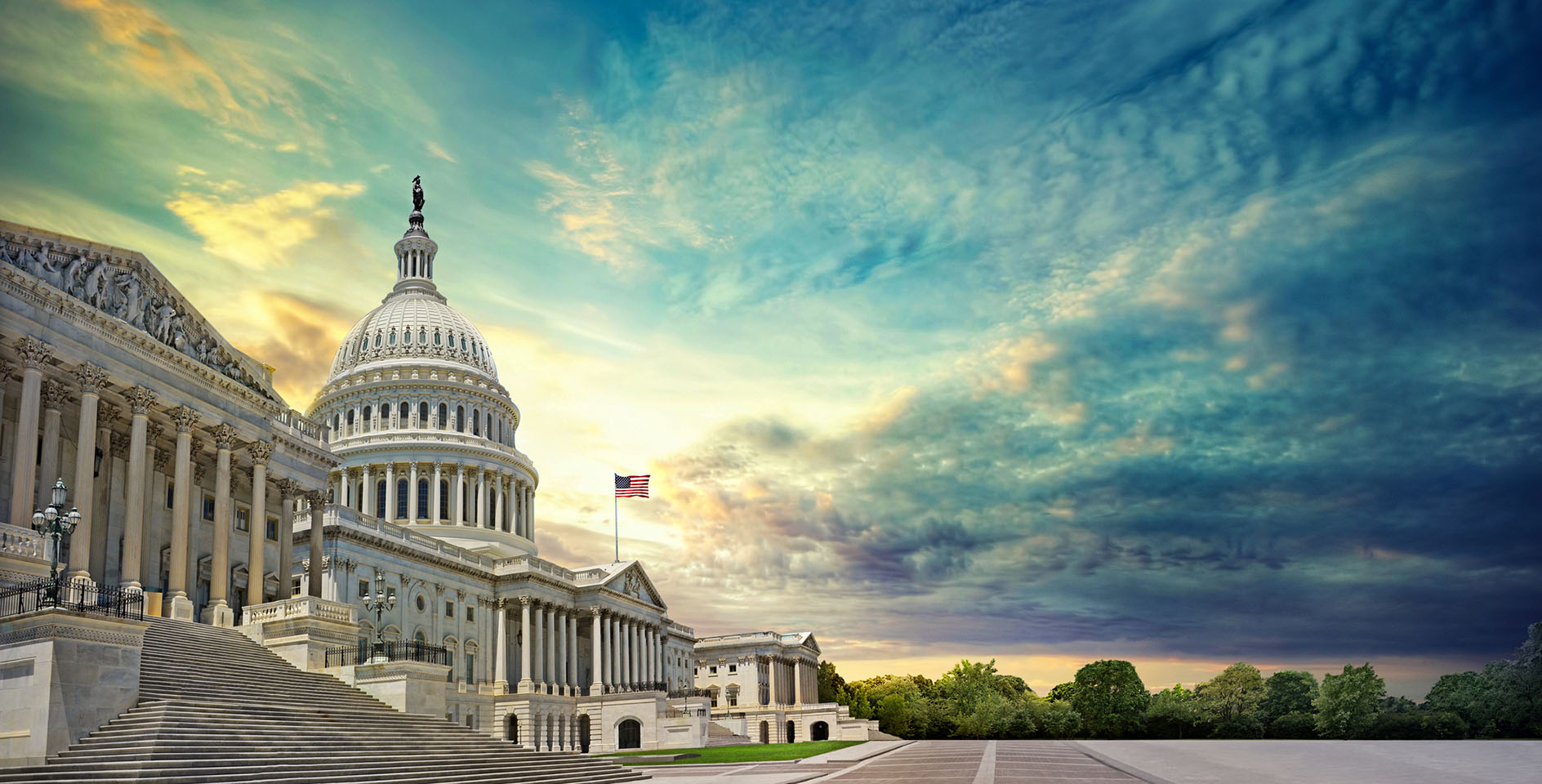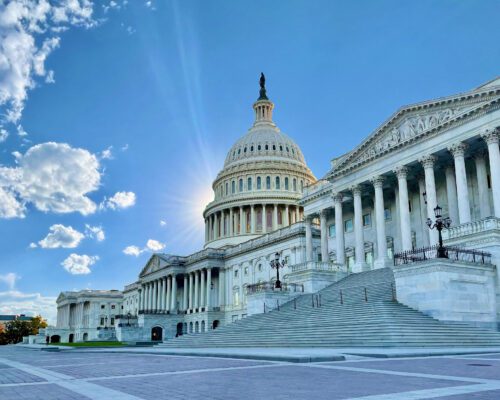Public policy advocacy is one of the primary ways that the ERLC fulfills its ministry in the public square. We recently released our 2023 Public Policy Agenda, which outlines more than three dozen policy issues that will shape our work in Washington, D.C., this year.
What will make advocacy challenging?
The first session of the 118th Congress is now underway, and it begins as the nation is grappling with war around the world, inflation at home, and deep division across our citizenry. This also begins a new era of divided government with a Democratic president, a narrow Democratic majority in the U.S. Senate, and a slim Republican majority in the House.
This dynamic ensures legislating and governing will be a difficult task, and that broadly speaking, only legislation with substantial bipartisan consensus will be able to pass both chambers and be signed by President Biden. Amidst these realities, the ERLC will work to advance and make progress on our public policy agenda in these divided times at the federal level.
Below is a sample of our policy priorities in the areas of religious liberty, sanctity of human life, family and marriage, and human dignity. Some of these issues have been a part of the ERLC’s public policy agenda for the last several years; other issues are new and a product of the political moment in which we find ourselves.
Religious Liberty
Oppose The Equality Act
There have been multiple pieces of legislation introduced in recent years which aim to, at their most extreme, codify the demands of the sexual revolution and radically reshape religious freedom in the United States. In February 2021, the House passed The Equality Act—a bill that would amend the 1964 Civil Rights Act to add sexual orientation and gender identity as protected classes under federal civil rights law.
The bill would curtail religious freedom protections, hinder the work of healthcare professionals and faith-based hospitals, undermine civil rights protections for women and girls, and ultimately steamroll the consciences of millions of Americans.
The ERLC believes that this bill represents the most significant threat to religious liberty ever considered in Congress.
We will continue to lead efforts to oppose the Equality Act and any similar legislation introduced this session. As we do so, we will advocate for a public square solution that protects and upholds the dignity of all people and their rights, while ensuring that religiously motivated individuals and institutions are free to live and act according to their deeply held convictions.
Support Conscience Protections for Healthcare Workers
No healthcare worker should have to compromise their deeply held beliefs in order to administer care. Now, both in a post-Roe world and as our country’s views on issues of sexuality and gender have shifted rapidly, healthcare providers are being increasingly mandated to participate in or provide insurance coverage for procedures and practices that conflict with their religiously informed consciences.
The Conscience Protection Act provides conscience protections for Americans with religious or moral objections to health insurance that covers contraception methods.
We believe such legislation is critical to curb conscience abuses across the country.
Additionally, the ERLC has submitted public comments on a number of regulatory actions from the Biden administration that further threaten the consciences of medical professionals. One such recent action to which the ERLC will be filing comments in opposition is the rescission of the Department of Health and Human Services’ Trump-era “Conscience Rule.”
The ERLC will continue to advocate for the protection of consciences in legislation and will oppose any regulatory actions that attempt to rescind similar protections in federal law.
Respond to the Decision in 303 Creative v. Elenis
In December 2022, the Supreme Court heard oral arguments in this important religious liberty case. Lorie Smith, a creative professional who has created many kinds of custom websites for all types of people, refuses to use her “design skills and creativity to express messages that violate her deeply held religious convictions.” The state of Colorado views Smith’s work as a public accommodation. This would subject it to Colorado’s Anti-Discrimination Act, which prohibits discrimination, including refusal of service, against any protected class, including sexual orientation or gender identity. This puts Smith’s desire to run her business according to her beliefs in direct conflict with Colorado’s law.
Though the results of this case will have ramifications for religious liberty, the primary issue centers on speech.
The central question before the court is “whether applying a public-accommodation law to compel an artist to speak or stay silent violates the free speech clause of the First Amendment.” A decision in this landmark case is expected this summer.
Continue the China International Religious Freedom Initiative
Over the past several years, the Chinese government has severely escalated its persecution of religious minorities, including Christians. Since April 2017, China has systematically detained more than one million Uyghur Muslims and placed them into “re-education camps” where they are prevented from engaging in their religious practices and subjected to physiological and, oftentimes, physical persecution.
The ERLC has grave concerns about the trajectory of China’s approach to Christians and other religious minorities and is committed to working with other nongovernmental organizations to direct both United States and international pressure towards alleviating their persecution.
In 2021, the Southern Baptist Convention was the first denomination to pass a resolution rightly calling what is happening to the Uyghur people a genocide. The ERLC has hosted events to highlight these atrocities, advocated for the genocide determination with both the Trump and Biden administrations, and worked for the passage of the Uyghur Forced Labor Prevention Act. We will continue to be a voice for the persecuted in China.
Sanctity of Human Life
Protect Pro-life Riders in the Congressional Appropriations Process
Each year as we carefully analyze Congress’s appropriations bills, we work to ensure that historic pro-life riders are maintained and included. Pro-life amendments have been attached to appropriations bills as “riders” for years. For over 40 years, the Hyde Amendment has protected American consciences and been recognized by each Congress as they passed it into law through the appropriations process.
In 2022, we saw a serious threat to the Hyde Amendment, as the House abandoned its inclusion in appropriations legislation for the second time since it was enacted. It was ultimately a significant victory for these riders to be included in the fiscal year 2023 appropriations package. An end to the Hyde Amendment is a major priority of groups that oppose our pro-life views.
We will work to preserve the Hyde Amendment not only because it prevents government-funded violence against preborn children but also because it prevents the government from coercing citizens to act against their consciences in the taxpayer incentivization of something we believe to be unjust.
Other pro-life amendments include the Weldon Amendment, protecting the consciences of healthcare workers from discrimination on the basis of their refusal to provide, pay for, or refer women for abortion. The Siljander Amendment prohibits United States funds from being used to lobby for or against abortion. We will seek to ensure that we do not sacrifice other riders such as the Dornan Amendment, the Kemp-Kasten Amendment, the Dickey-Wicker Amendment, or the Helms Amendment at the expense of saving the Hyde Amendment.
All of these pro-life riders are important and must be protected.
Ending the Proliferation of Chemical Abortions
Chemical abortion (sometimes referred to as medication abortion or pharmaceutical abortion) is a method that uses an abortifacient to stimulate uterine contractions and end the pregnancy in a process similar to miscarriage. As surgical abortion procedures have declined, chemical abortions have risen, making up 53% of the total in 2020. As many states severely restricted or banned access to abortion following the Dobbs decision, it is likely that this number will continue rising.
Because these drugs not only take the life of a preborn child but also pose serious threats to the women who take them, the ERLC has asked the Food and Drug Administration (FDA) to categorize the abortion pill mifepristone, sold under the brand name Mifeprex, as an “imminent hazard to the public health.”
However, the FDA in 2021 moved to increase access by permanently allowing these abortion pills to be delivered by mail. In January of 2023, the FDA moved to allow local retail pharmacies to dispense these drugs in states where it is legal, furthering the accessibility of these life-taking drugs and putting more women and preborn children at risk.
The ERLC supports federal legislation such as the SAVE Moms and Babies Act that would begin to regulate this predatory industry.
Oppose the Women’s Health Protection Act
The Women’s Health Protection Act removes all restrictions and limits on abortion and allows for abortion up to the point of birth. Additionally, this bill removes all pro-life protections at the federal and state levels and eliminates a state’s ability to legislate on abortion. This bill also fails to protect the consciences of American taxpayers by utilizing taxpayer dollars to pay for abortions.
This bill was passed by the House of Representatives twice last year—the most pro-abortion bill to have passed the House—but did not receive a vote in the Senate. The ERLC and the pro-life community strongly opposed this bill and will continue to do so in the upcoming year.
Family and Marriage
Support Pro-Family Policy in a Post-Roe World
If the family is the most foundational unit of society, it is crucial that all aspects of federal policy provide a platform for families to thrive and flourish.
An essential aspect of our advocacy for life in this new, post-Roe world must be for policies that address financial insecurity and other key factors that drive women to seek abortions.
The ERLC will be advocating for policies that remedy marriage penalties, empower abortion-vulnerable women to choose life, and provide baseline levels of support for new parents. This is consistent with the 2022 SBC Resolution that urged a focus on “pro-life and pro-family policies that serve and support vulnerable women, children, and families” as we work to “eliminate any perceived need for the horror of abortion.”
Support the Adoptee Citizenship Act
Prior to the Child Citizenship Act of 2000, the administrative steps required of families adopting internationally were unnecessarily burdensome. The Child Citizenship Act of 2000 granted automatic citizenship to all foreign-born children brought to the United States who had at least one parent who was a United States citizen.
Unfortunately, that act only applied to adoptees under the age of 18 when the bill was enacted, leaving an entire population of adopted children without full U.S. citizenship. The Adoptee Citizenship Act closes the loophole to provide immediate citizenship to these children already adopted by U.S. citizens yet left out of the previous bill.
Ensure Intercountry Adoption Remains a Viable Option
In fiscal year 2021, only 1,785 children were welcomed into families through intercountry adoption. There has also been a decline in stateside adoption agencies facilitating intercountry adoption, narrowing the options for prospective parents. Many countries and cultures are becoming more open to domestic foster care and adoption, which is certainly good news and ought to be encouraged.
However, there are still millions of orphans worldwide waiting to be raised in a family where they are known and loved instead. Intercountry adoption must remain a viable option for welcoming children into homes, and we must do all we can to facilitate those adoptions.
The ERLC is working with like-minded partners and the U.S. Department of State to ensure that intercountry adoption remains a viable option for families and vulnerable children around the world.
Human Dignity
Support a Permanent Solution for Dreamers
After multiple attempts to rescind the Deferred Action for Childhood Arrivals (DACA) program, litigation that went all the way to the Supreme Court, and new litigation that is likely headed back to the high court, those young immigrants who were brought to the United States by their parents remain in an unstable situation. These immigrants broke no law, and yet they remain without permanent legal status. Now young adults, these Dreamers—many of whom have families of their own with children who are U.S. citizens—are workers, students, and positive contributors to their communities.
At the same time, we continue to see record numbers of individuals seeking asylum at our southern border, creating a humanitarian crisis.
As part of desperately needed immigration reform, we will continue to work closely with Congress and the Biden administration to create a permanent legislative solution for our Dreamer neighbors that also addresses necessary border improvements.
Support Further Criminal Justice Reform
Following on the heels of the historic First Step Act, which was passed at the end of 2018, the ERLC will continue to advocate for reforms that focus on transformation and rehabilitation.
Two such bills are the Recognizing Education, Employment, New Skills, and Treatment to Enable Reintegration Act (RE-ENTER Act) and the Eliminating a Quantifiably Unjust Application of the Law Act (EQUAL Act). The RE-ENTER Act allows eligible individuals with federal convictions to apply for a certificate of rehabilitation from a district court, attesting to a law-abiding future and a commitment to successful reintegration into society.
Several states already issue such certificates, which have proven successful in aiding recipients with employment and housing—two factors necessary for successful reintegration. The EQUAL Act would remedy the disparity in federal sentencing for crack and powder cocaine related crimes. Over 40 states have already corrected this unjust, inconsistent practice.
Both of these bills have broad bipartisan support, and the ERLC will continue to advocate for their swift passage.
Rebuild the Refugee Resettlement Program
Though President Biden set an ambitious goal of resettling 125,000 refugees in fiscal year 2022, the United States only successfully resettled about 25,000 individuals. This is largely due to previous cuts to the program and to the network of nonprofits and community organizations that support refugee resettlement. For the last several years, the United States has not carried its share of the burden at a time of historically high levels of refugees and internally displaced people worldwide.
These changes to the refugee resettlement program have had devastating effects on those who have been persecuted for their faith, particularly our brothers and sisters in Christ.
Additionally, a well-functioning refugee system is an important tool to relieve pressure at the U.S.-Mexico border, where asylum seekers have continued to come in record numbers. President Biden has again set a goal of resettling 125,000 refugees in fiscal year 2023.
The ERLC is working to ensure that resettlement agencies and churches working with these refugees are able to fully rebuild and welcome these vulnerable people well. We will continue to advocate for fully restoring the refugee resettlement program and America’s legacy as a beacon of hope to those fleeing persecution.












